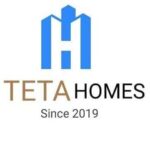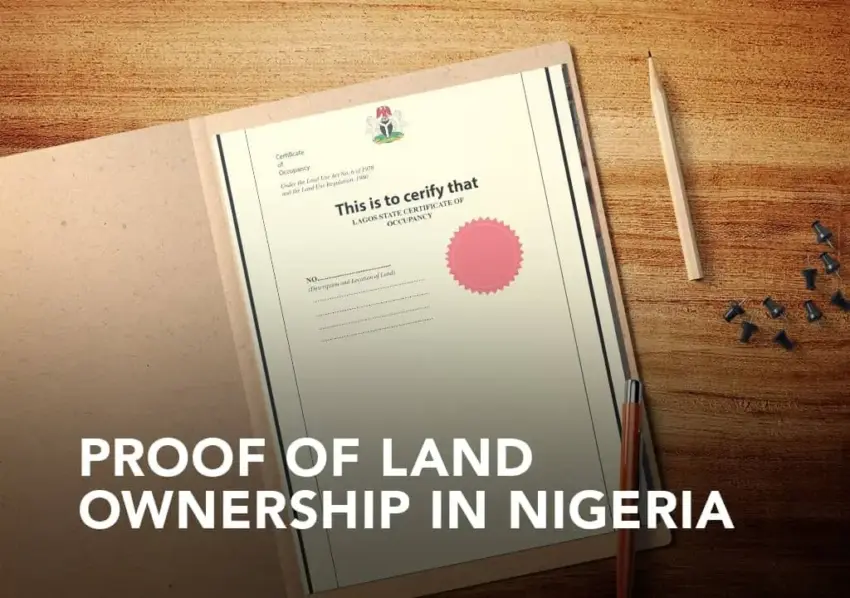Learning about the different land titles in Nigeria and their meanings is a skill you must have if you want to play in the real estate game.
Buying land in Nigeria is a great investment for everyone, but land investment can be daunting without proper documentation or good titles.
You must verify the authenticity of the property you want to buy. But to do this, you need to understand land titles and documents in Nigeria, and what they mean.
This article covers the essential things you need to know about the different types of titles for property in Nigeria.
Your land may not need to have all the documents covered in this article, but some plots of land require that you have more than one title to be recognized as the rightful owner
Who issues land titles in Nigeria?

Properties were owned and controlled by communities or communal authorities prior to the enactment of the Land Use act in 1978. These authorities had the powers to apportion or rent out properties at will.
However, the Land Use act in its decree, gave the state government the powers to own and control every land, especially land in urban areas, on behalf of the people.
Therefore, the state government issues land titles.
The government is said to lease any piece of land paid for by anyone for a period of 99 years, after which the buyer has to renew the title or lease
Are land titles public records?

Land records are held in more than 3000 jurisdictions which are public. The county and municipal hierarchies hold records like titles and deeds.
In Nigeria, land titles can also be said to be public records in the sense that it is accessible to anyone for verification of who the actual owner is.
For example, if you are interested in buying a piece of land, it is required that you go to the appropriate authorities to verify the authenticity of the land, and also, the real owner of the land.
This step helps to keep you away from fraudulent land transactions. It also helps you understand the status of the land you want to buy. Anyone can actually access land title records for the purpose of verification.
What are land titles in Nigeria and their meanings?

Although you own a property, I can tell you for free that anyone can come out and claim that property unless you have the necessary title documents recognized, approved and issued by the government.
The records of all legally approved land titles are found at the office of the land registry in every state.
Having your land titles gives you the right to do whatever you want with the land; and you can also transfer it to a new owner should you decide to sell.
One key thing you need to find out before buying a property is the title(s) on the land. It is imperative that you have a good understanding of the very document that verifies the real ownership of the property.
What are land titles in Nigeria and their meanings? Below is a list of land titles and their importance:
1. Freehold:
For a property, especially land to be freehold, it means that the government does not have any interest in it.
2. Under acquisition:
Any land or property considered under acquisition, it means that there is government interest on it. This could be for the purpose of infrastructural development or any other government project.
Always avoid land under acquisition, because acquiring such property is akin to sitting on a keg of gunpowder.
One day, the government will wake up and ask you to relinquish it. Bad business huh?
Land or property being under acquisition can be either under committed acquisition or global acquisition.
When a government has mapped out a portion of land for a particular project, that land is said to be under committed acquisition, which means that such land cannot be sold or given to organisations or individuals for their personal development.
3. Global Acquisition
On the other hand, any land with global acquisition has not yet been assigned or mapped out for a particular project by the government. Such land may, in the future, be either released as freehold by the government or committed for particular projects.
However, there are two ways to make a piece of land with global acquisition free. They are: ratification and excision.
4. Certificate Of Occupancy (C of O):
Any investment in a property with a C of O is very safe. The certificate of occupancy proves that someone is permitted by law through the state government to occupy or own a property.
The C of O is a very essential land document. It is used during land disputes to verify the true owner of a piece of land or property. It can also be used as a collateral for loans in banks and other financial bodies.
When a piece of property is sold to another person, the new owner does not require another C of O, rather, a deed of assignment together with the governor’s consent.
5. Governor’s Consent:
This is a document that is required for a land transaction (land with C of O) to be deemed legal from a government perspective.
This is because the first owner of any piece of land is eligible to obtain a C of O. Any subsequent buyer is required to obtain a governor’s consent – just as the name implies.
This means that the governor has consented to the transaction involving the transfer of ownership of a piece of property with C of O from one person to another.
6. Registered Survey Plan:
A survey plan is a document that details the description, location and the exact size of the land. With the coordinates on the survey, it is easy to check the status of the land.
All you have to do is, take the coordinates to the office of the surveyor-general and verify if the land is freehold or under government acquisition.
The survey plan can save you from a whole lot of trouble and can help you make better land investment decisions.
7. Land Payment Receipt:
This document, just like every receipt, shows the exact amount of money paid for a piece of land or property, and to whom the money was paid.
The receipt is important in order to prevent unpleasant surprises, like when the seller wakes up one morning to say that you never paid him at all or in full.
Without the receipt, you may lose your land in court or may be asked to pay the seller more money.
Moreover, when registering your land, the receipt is also a required document for that process.
Please make sure to collect a receipt during every land transaction, and be sure the receipt stipulates the exact amount paid for the land and to whom the payment was made.
8. Deed of Assignment:
Also known as “Deed of Conveyance,” which means the transfer of ownership. This document is proof that the buyer is the new owner of a piece of land and that the owner has transferred ownership, rights and titles to the buyer.
Essential information contained in the deed of assignment includes, the date of transfer of ownership and a detailed description of the land.
The deed has to be recorded at the land registry to legally prove that the land in question has exchanged hands.
9. Contract of Sale:
This is not a registrable document, however, it is useful when someone wants to buy a property. Through the contract of sale, both the buyer and seller come to agreement on some terms before closing the transaction.
10. Excision and Gazette:
Excision is done when the government releases a portion of land back to the indigenous owners for settlement and other development purposes.
To excise a portion of land means to cut out the land. This land is cut by the government and given to the indigenes or original owners as compensation.
When this portion of land is published in the government official gazette, the land is now said to have gazette as a title.
Land with excision and gazette is a very good investment opportunity. It is 100% safe to buy and develop. It is easy to process a proper title like the C of O for this land.
11. Deed of Mortgage:
This is applicable in mortgage transactions. It indicates a temporary transfer of a piece of property from a borrower (called mortgagor) to a lender (called mortgagee).
The borrower will be able to get back their property from the lender whenever they have fully offset the loan amount with the accrued interest.
12. Deed of Gift:
This document proves that a piece of property has been gifted to someone (called the Donee) by another (called the Donor).
13. The Grant of Probate:
A grant of probate is a document that results from the inheritance in the probate registry, used to demonstrate the validity of a deceased’s will.
The will vests all of the estate’s assets in the executors, who are now legally acknowledged as the property’s owners.
All property documents belonging to a late owner are no longer valid to transmit any interest in the assets they left behind.
Now, the only acknowledged legal documents establishing ownership of such property will be the Probate.
14. Judgement of Court:
This is a document that is required when a piece of property is transferred from one person to another through a court judgement. Any property that is acquired through a lawsuit has to secure a copy of the judgement.
15. Assent:
A legal document known as assent is used by the executors or administrators of an estate to transfer ownership of a specific estate to beneficiaries or any other buyer. A duplicate of a letter of administration or grant of probate must always be included.
WHERE ARE LAND TITLES KEPT?
Land titles and records are well documented in the Register of Deeds which is safely kept at the Land Registry Offices of every state in Nigeria.
The Land Registry Directorate is a very crucial department that has the responsibility of making sure all land transaction records are up to date.
HOW LONG DOES IT TAKE TO PERFECT LAND TITLE IN NIGERIA?
It takes about 3 months, especially in Lagos state, to get approval and perfect a land title.
HOW LONG IS LAND OWNERSHIP IN NIGERIA?
According to Section 1 of the Land Use Act of 1978, the legislation grants the State Government ownership of all land in the country, which is controlled by the Governor. According to the Act, real estate interests are leasehold for tenure not exceeding 99 years.
HOW MANY NAMES CAN BE ON A LAND TITLE?
Even though it is not common to see more than one name on a land title, it is not impossible for a property tohave more than one owner. These owners will also have their names appear on the deed.
WAYS OF PROVING TITLE TO LAND IN NIGERIA

Land has always been a source and symbol of wealth since time immemorial. Because of its significance, it has constantly been in the centre of communal conflicts and disputes.
For you to be on a safe side with your land investment, it is important to understand what it requires to be a bonafide owner of a property and how you can prove ownership.
See: 12 Critical questions you should ask before buying a property in Nigeria
You have to realise that there are two types of interest in land. The first is legal interest which supersedes the other one. This interest supports the person with legal documents to the land or property.
If for example, two individuals or groups are having a dispute over a particular piece of land, the court of law recognizes the group or individual who presents authentic and verifiable documents, like the C of O, as the real owner of the land.
The second interest is equitable interest, this is the interest derived out of the understanding that people can possibly acquire land with incomplete documents or titles. The law will be fair enough to recognize the individual as the rightful owner of the property.
However, if someone comes with a verifiable title (legal interest) for that said land, the law automatically recognizes them as the bonafide owner of the land.
In cases of land dispute, the appeal court has a list of ways you can prove ownership of the land:
- 1. Traditional history
- 2. Providing the documents of your title
- 3. Proof of acts of ownership over a period of time
- 4. Acts of long possession and enjoyment of the land
- 5. Proving possession of adjacent and connected land in circumstances that make it possible that the owner of the adjacent and connected land is the owner of the disputed land.




citalopram otc https://citaloprama.com/# – citalopram tablet citalopram coupon
Grunewald GmbH & Co. KG
cephalexin prices cephalexin no prescription cephalexin 500 mg tablet
snel 15000 geld lenen